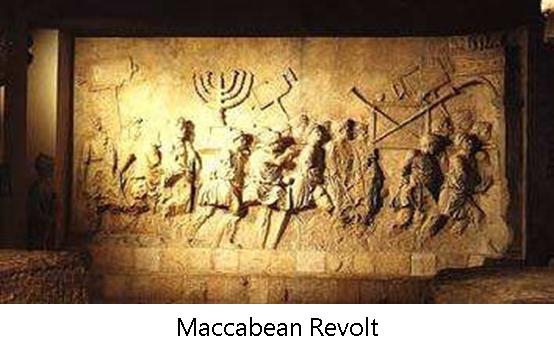The following article was obtained through the Jewish Virtual Library and gives a brief synopsis of the members or followers of the family of the Jewish leader, Mattathias ben Johanan, who led the Maccabean Revolt against the Seleucid Empire (167–160 BCE).
The Maccabees/Hasmoneans: History & Overview (166 - 129 BCE)
 The death of Alexander the Great of Greece in 323 BCE led to the breakup of the Greek empire as three of his generals fought for supremacy and divided the Middle East among themselves.
The death of Alexander the Great of Greece in 323 BCE led to the breakup of the Greek empire as three of his generals fought for supremacy and divided the Middle East among themselves.Ptolemy secured control of Egypt and the Land of Israel. Seleucus grabbed Syria and Asia Minor, and Antigonus took Greece. The Land of Israel was thus sandwiched between two of the rivals and, for the next 125 years, Seleucids and Ptolemies battled for this prize. The former finally won in 198 B.C. when Antiochus III defeated the Egyptians and incorporated Judea into his empire.
Initially, he continued to allow the Jews autonomy, but after a stinging defeat at the hands of the Romans he began a program of Hellenization that threatened to force the Jews to abandon their monotheism for the Greeks' paganism. Antiochus backed down in the face of Jewish opposition to his effort to introduce idols in their temples, but his son, Antiochus IV, who inherited the throne in 176 B.C. resumed his father's original policy without excepting the Jews.
A brief Jewish rebellion only hardened his views and led him to outlaw central tenets of Judaism such as the Sabbath and circumcision, and defile the holy Temple by erecting an altar to the god Zeus, allowing the sacrifice of pigs, and opening the shrine to non-Jews.
The Jewish Hammer
 Though many Jews had been seduced by the virtues of Hellenism, the extreme measures adopted by Antiochus helped unite the people.
Though many Jews had been seduced by the virtues of Hellenism, the extreme measures adopted by Antiochus helped unite the people.When a Greek official tried to force a priest named Mattathias to make a sacrifice to a pagan god, the Jew murdered the man. Predictably, Antiochus began reprisals, but in 167 BCE the Jews rose up behind Mattathias and his five sons and fought for their liberation.
The family of Mattathias became known as the Maccabees, from the Hebrew word for "hammer," because they were said to strike hammer blows against their enemies. Jews refer to the Maccabees, but the family is more commonly known as the Hasmoneans.
Like other rulers before him, Antiochus underestimated the will and strength of his Jewish adversaries and sent a small force to put down the rebellion. When that was annihilated, he led a more powerful army into battle only to be defeated. In 164 BCE, Jerusalem was recaptured by the Maccabees and the Temple purified, an event that gave birth to the holiday of Chanukah.
Jews Regain Their Independence
| Judah goes up against a Seleucid imperial soldier. Artwork by Mark Strauss |
In the year 142 BCE, after more than 500 years of subjugation, the Jews were again masters of their own fate.
When Mattathias died, the revolt was led by his son Judas, or Judah Maccabee, as he is often called. By the end of the war, Simon was the only one of the five sons of Mattathias to survive and he ushered in an 80-year period of Jewish independence in Judea, as the Land of Israel was now called. The kingdom regained boundaries not far short of Solomon's realm and Jewish life flourished.
The Hasmoneans claimed not only the throne of Judah, but also the post of High Priest. This assertion of religious authority conflicted with the tradition of the priests coming from the descendants of Moses' brother Aaron and the tribe of Levi.
It did not take long for rival factions to develop and threaten the unity of the kingdom. Ultimately, internal divisions and the appearance of yet another imperial power were to put an end to Jewish independence in the Land of Israel for nearly two centuries.
Sources: Mitchell G. Bard, The Complete Idiot's Guide to Middle East Conflict. 4th Edition. NY: Alpha Books, 2008.


